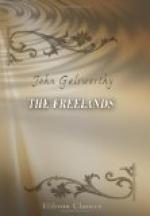“I imagined you’d gone.”
“I’ve been having a look round. It’s very jolly here. My affections are in the North, but I suppose this is pretty well the heart of England.”
“Near ‘the big song,’” Felix answered. “There’ll never be anything more English than Shakespeare, when all’s said and done.” And he took a steady, sidelong squint at his companion. ’This is another of the types I’ve been looking for,’ he reflected. The peculiar ‘don’t-quite-touch-me’ accent of the aristocrat—and of those who would be—had almost left this particular one, as though he secretly aspired to rise superior and only employed it in the nervousness of his first greetings. ‘Yes,’ thought Felix, ’he’s just about the very best we can do among those who sit upon ’the Land.’ I would wager there’s not a better landlord nor a better fellow in all his class, than this one. He’s chalks away superior to Malloring, if I know anything of faces—would never have turned poor Tryst out. If this exception were the rule! And yet—! Does he, can he, go quite far enough to meet the case? If not—what hope of regeneration from above? Would he give up his shooting? Could he give up feeling he’s a leader? Would he give up his town house and collecting whatever it is he collects? Could he let himself sink down and merge till he was just unseen leaven of good-fellowship and good-will, working in the common bread?’ And squinting at that sincere, clean, charming, almost fine face, he answered himself unwillingly: ‘He could not!’ And suddenly he knew that he was face to face with the tremendous question which soon or late confronts all thinkers. Sitting beside him—was the highest product of the present system! With its charm, humanity, courage, chivalry up to a point, its culture, and its cleanliness, this decidedly rare flower at the end of a tall stalk, with dark and tortuous roots and rank foliage, was in a sense the sole justification of power wielded from above. And was it good enough? Was it quite good enough? Like so many other thinkers, Felix hesitated to reply. If only merit and the goods of this world could be finally divorced! If the reward of virtue were just men’s love and an unconscious self-respect! If only ‘to have nothing’ were the highest honour! And yet, to do away with this beside him and put in its place—What? No kiss-me-quick change had a chance of producing anything better. To scrap the long growth of man and start afresh was but to say: ’Since in the past the best that man has done has not been good enough, I have a perfect faith in him for the future!’ No! That was a creed for archangels and other extremists. Safer to work on what we had! And he began:




